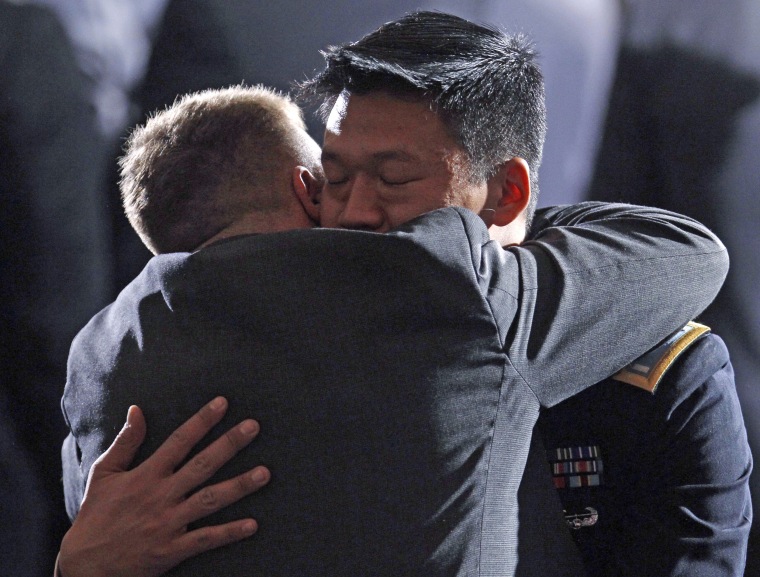The Pentagon is stepping up its efforts to help gay and lesbian veterans who were discharged from the U.S. military under the now-defunct “don’t ask, don’t tell” policy update their records.
New initiatives announced Wednesday, the 12th anniversary of the policy’s 2011 repeal, include a proactive review process of the records of dismissed veterans and the launch of a new webpage aggregating resources for LGBTQ people who served in the armed forces.
The Defense Department will independently identify veterans who were discharged from active duty between 1994 and 2011 — when the policy was in effect — because of their sexual orientation and who received a discharge that was less than honorable, the department said at a media roundtable Wednesday. The department will retrieve any relevant military records pertaining to those veterans and submit them for a potential correction. The updated policy was first reported by CBS News.
“Over the past decade, we’ve tried to make it easier for Service members discharged based on their sexual orientation to obtain corrective relief,” Defense Secretary Lloyd Austin said in a statement Wednesday. “While this process can be difficult to navigate, we are working to make it more accessible and efficient.”
Prior to Wednesday’s announcements, veterans dismissed under “don’t ask, don’t tell” could only update their records by submitting an application and documents relevant to their service in order to receive a discharge upgrade. Some veterans have also hired attorneys and scheduled in-person hearings to assist their cases.
In addition to the new “proactive review” process, the department will still accept individual applications. The Pentagon, however, will be “redoubling our outreach to LGBTQ+ veterans discharged under Don’t Ask, Don’t Tell to encourage anyone who might be eligible to apply for corrections to their military records,” Deputy Defense Secretary Kathleen Hicks said at a news conference. “This outreach campaign will be online, by email, by mail, through nonprofits and veterans service organizations and more.”
The Pentagon did not immediately respond to NBC News’ request for comment.
There are different types of punitive and administrative military discharges, and those who receive anything other than an honorable discharge may be ineligible to receive some military benefits. In 2021, the Department of Veterans Affairs issued a clarification confirming that veterans dismissed for their sexual orientation, gender identity or HIV status were eligible to apply for benefits including health care and home loan guarantees.
The “don’t ask, don’t tell” policy was signed by President Bill Clinton in 1993 and was repealed by President Barack Obama. The policy was intended to allow gay, lesbian and bisexual people to serve in the military as long as they hid their sexual orientation.
An estimated 13,000 service members were discharged under the policy, but the number of LGBTQ service members dismissed for their sexual orientations or gender identities since World War II is thought to be at least 100,000, according to historians.
In July 2017, several years after the repeal of “don’t ask, don’t tell,” President Donald Trump announced that transgender people would be prohibited from enlisting in the military. The ban, which took effect in April 2019, reversed a policy announced in 2016 by the Obama administration. However, during President Joe Biden’s first week in office, he repealed the Trump administration’s ban, allowing transgender service members to once again enlist in the military and serve openly.

